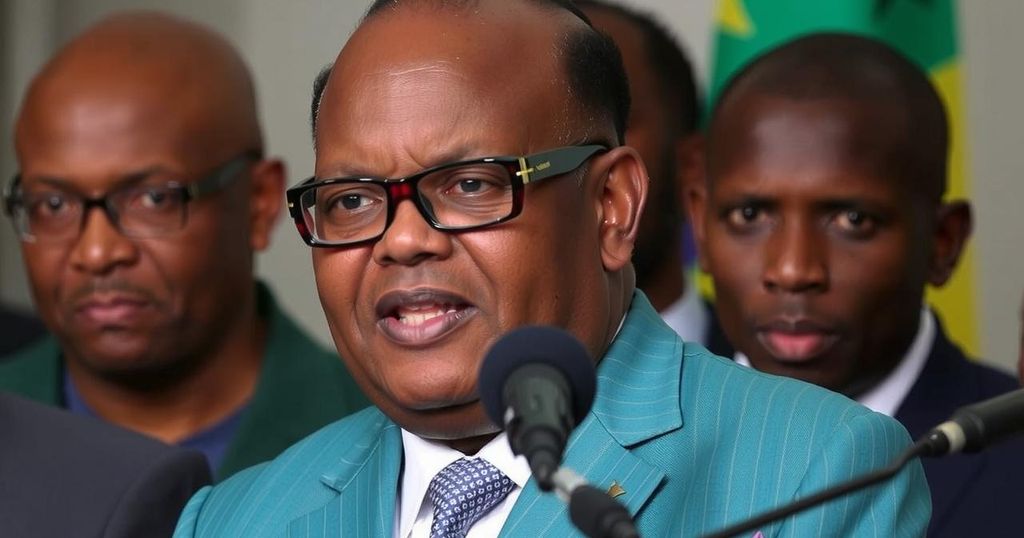Mozambique’s Supreme Court Confirms Election Results Amidst Rising Unrest
Mozambique’s top court has confirmed the ruling Frelimo party’s victory in the October presidential elections, potentially escalating protests following accusations of electoral fraud. Daniel Chapo received 65.2% of the vote, while opposition candidate Venâncio Mondlane garnered 24.2%. This ruling has fueled ongoing unrest, violence, and calls for electoral reform amidst a backdrop of significant public discontent, particularly among the youth.
Mozambique’s highest court has formally affirmed the electoral results of the presidential elections held on October 9, confirming the victory of Daniel Chapo from the ruling Frelimo party, who garnered 65.2% of the votes. This announcement has the potential to incite further protests after a climate of unrest that has persisted for over two months due to allegations of electoral fraud. The conclusion of the constitutional council, whose members predominantly originate from Frelimo, indicated discrepancies in vote counting yet failed to specify the exact nature of these anomalies. Meanwhile, opposition candidate Venâncio Mondlane of the Podemos party received 24.2% of the votes, a modest increase from preliminary counts. Despite his efforts to appeal to young urban voters, he remains significantly distant from the required majority for victory.
The weeks following the election have been marked by extensive protests, resulting in considerable violence and a tragic loss of life. Reports from Human Rights Watch assert that security forces have killed at least 130 individuals amidst these demonstrations. International observers have cited potential instances of ballot manipulations within the electoral process. Nevertheless, some analysts caution that Mondlane’s claims for a fair election remain uncertain. Concurrently, Mozambique faces an economic disruption due to the ongoing unrest, significantly exacerbated by the impact of Cyclone Chido, which caused severe destruction and casualties in the region.
Prior to the ruling, Mondlane urged his supporters to remain peaceful and refrain from violence while calling for sustained protests against the electoral verdict. His statements revealed the delicate balance between advocating for political change and ensuring public safety. In a post-ruling response, images broadcasted on Mozambican television illustrated instances of civil unrest, including tyre burnings in cities largely patrolled by armed state security forces. In light of this challenging political backdrop, Chapo, set to assume the presidency on January 15, expressed a commitment to electoral reform, asserting that dialogue is vital for establishing social harmony.
This situation in Mozambique presents a pivotal moment in its political landscape, as noted by analysts who observe the dynamics between a historically entrenched party and a shifting populace emboldened by a figure such as Mondlane. This escalation in public dissent signals a departure from traditional tactics, indicating a significant transformation in Mozambican politics marked by rising youth frustration and calls for greater political accountability.
The context of the recent election results in Mozambique stems from a history of political instability and allegations of corruption concerning electoral processes. The ruling Frelimo party has maintained a dominant position in Mozambican politics since the end of the civil war in 1992; however, rising public dissent has revealed significant tensions. The role of social movements and protests in shaping governance, particularly among disgruntled youth, has led to calls for more transparency and fairness in elections. The participation of international observers during the recent elections further highlights these growing concerns, emphasizing the need for credible elections in a nation still navigating the consequences of its past political struggles.
In conclusion, the confirmation of the election results by Mozambique’s constitutional council underscores the complexities surrounding the nation’s political landscape. The ruling has the potential to exacerbate existing tensions and fuel further civil unrest, particularly among disenfranchised youth seeking political reform. As Mozambique grapples with the fallout from this decision, the future of its governance remains precarious, with the responsibilities of both the ruling party and the opposition hanging in the balance. Ensuring a pathway towards social harmony will require genuine dialogue and reform to address the grievances of the populace, which have become increasingly pronounced.
Original Source: www.theguardian.com




Post Comment